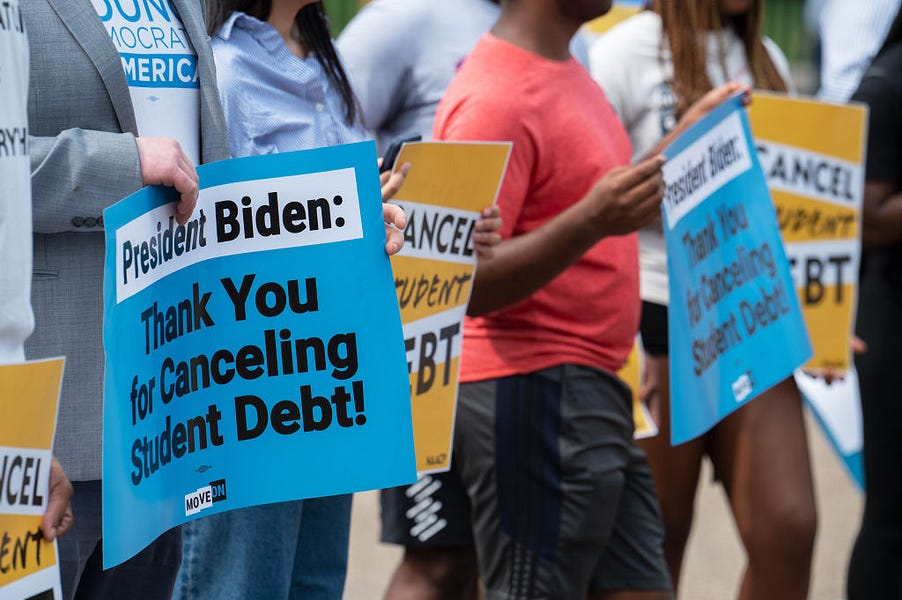President Biden’s plan to cancel billions in federal student loan debt is like a piñata: You can attack it from any angle and find some reward. In short, people making less than $125,000 will get $10,000 of their debt forgiven, no strings attached. Recipients of needs-based Pell grants will see up to $20,000 erased.
It might be a stretch to say this order is literally lawless, but it’s close. The White House claims the 2003 Higher Education Relief Opportunities for Students Act gives Biden unchecked authority to cancel student debt (a power even Speaker Nancy Pelosi has said he doesn’t have). The HEROES Act, passed in the wake of 9/11, was meant to help military personnel and others with student debt relief in wartime or national emergencies. Congress surely didn’t intend to give the president unilateral power to erase all civilian student loans as he sees fit.
A president who relentlessly boasts that, thanks to his withdrawal from Afghanistan, America is “not at war” is invoking wartime powers for his personal—and partisan—domestic policy priorities. Many who fretted over authoritarianism’s dark shadow when Donald Trump stretched his powers for political expediency are remarkably untroubled by this imperial diktat.
Canceling student debt, long an obsession of progressives, is seriously regressive. According to the nonpartisan Penn Wharton Budget Model, more than 6 in 10 beneficiaries of the $10,000 blanket forgiveness are in the top 60 percent of the income distribution.
But that’s just a snapshot. Many of those recipients are young people just starting their careers. According to one typical study, having a four-year college degree increases lifetime earnings by almost $2.3 million — an 84 percent premium above having just a high school diploma. A 2019 College Board report found that the median full-time worker with a bachelor’s degree made just shy of $25,000 more per year and those with a master’s degree made twice as much ($80,200) as those with just a high school diploma ($40,500).
Why a middle-aged sanitation worker struggling with car payments or a near-retirement supermarket cashier with a mortgage are less deserving of debt relief than a young lawyer or members of Congress with student loan debt is a mystery to me. An even deeper mystery: Why should those blue-collar workers—never mind people who already paid off their student loans—be helping reduce the debts of young professionals? The National Taxpayers Union estimates that the lost revenue to the federal government from debt cancellation would pencil out to an average burden of $2,503.22 per U.S. taxpayer.
Biden also crows dubiously that he’s a zealous fighter of both inflation and the deficit. But Jason Furman, President Obama’s top economic adviser, argues that Biden’s move in “pouring roughly half trillion dollars of gasoline on the inflationary fire that is already burning is reckless.” He also agrees that it erases all of the deficit reduction in the Inflation Reduction Act. Obama’s treasury secretary, Larry Summers, says that it’s a giant misallocation of resources. Penn Wharton estimates the final cost of the Biden plan (including its income-based loan repayment program) could be anywhere between $500 billion and $1 trillion.
What offends me most, however, isn’t the bad policy. It’s the partisan cynicism married to glib sanctimony that this is a morally heroic policy. Contrary to a lot of progressive rhetoric, most young Americans don’t have student debt, not least because most young Americans didn’t go to college at all.
But the Democratic Party, having only recently disabused itself of the idea it can simply ride the demographic growth of nonwhite voters to a permanent majority, now sees its future as the party of the college educated, including white college graduates, who’ve emerged as an indispensable bloc for Democrats. That’s why progressives talk about young people the same way they talk about women and minorities—as if simple membership in one category compels partisan allegiance. Sen. Bernie Sanders, for instance, has claimed that the “entire” millennial generation is saddled with a “lifetime of debt for the ‘crime’ of doing the right thing.” This is populist claptrap, a crude attempt to fuel generational warfare.
And now Biden, who campaigned and won on his claim to be a unifying moderate, is caving to this stuff, undoubtedly with the hope to boost turnout among younger voters, who often sit out midterms.
There are any number of ways to provide targeted relief to the college-debt-burdened working poor and to reform the runaway inflation in higher ed costs. But Biden’s proposal isn’t aimed at solving problems. It’s aimed at creating, and catering to, a constituency.







Please note that we at The Dispatch hold ourselves, our work, and our commenters to a higher standard than other places on the internet. We welcome comments that foster genuine debate or discussion—including comments critical of us or our work—but responses that include ad hominem attacks on fellow Dispatch members or are intended to stoke fear and anger may be moderated.
With your membership, you only have the ability to comment on The Morning Dispatch articles. Consider upgrading to join the conversation everywhere.